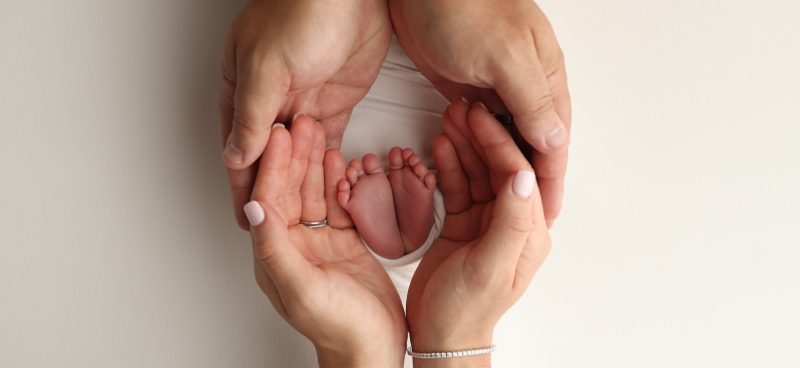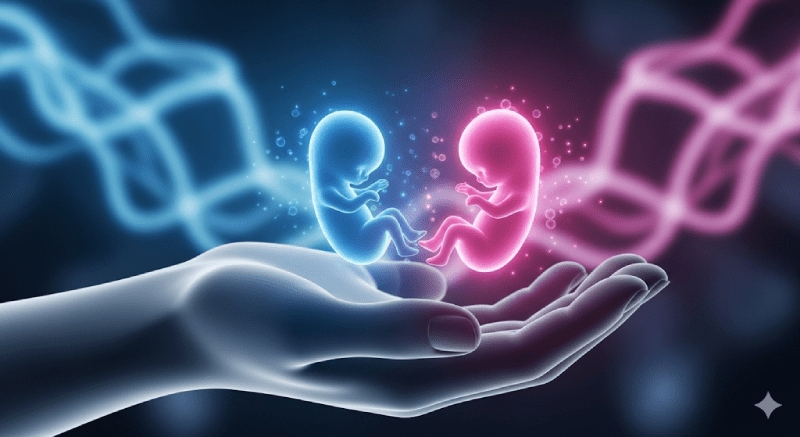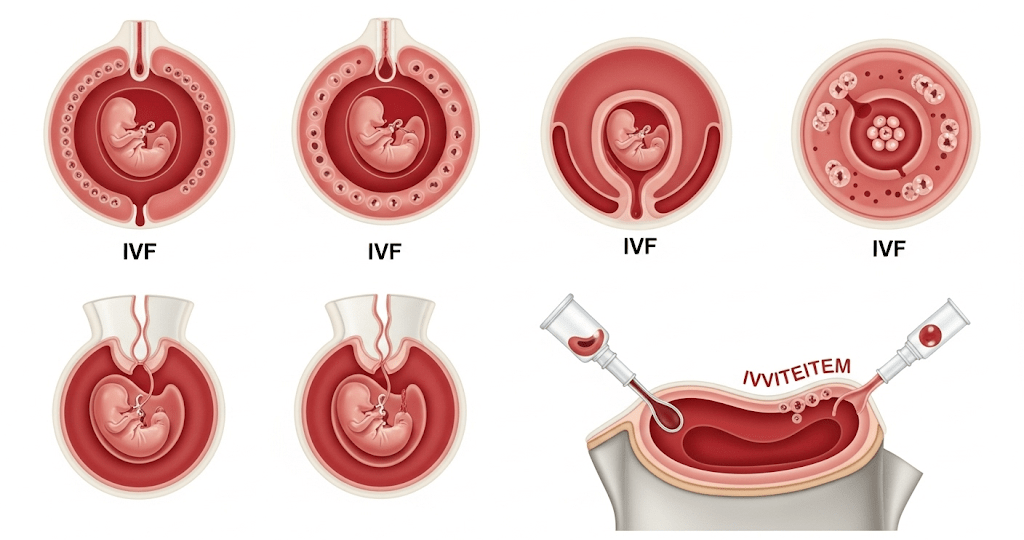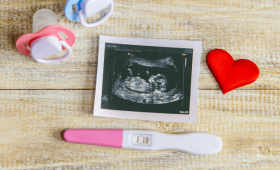A Journey of Hope Begins
IVF treatment is a journey that is both hopeful and emotionally challenging for couples dreaming of having a child. Facing a diagnosis of infertility and then navigating the complex stages of treatment can put significant pressure on couples’ physical and mental well-being. However, thanks to new approaches offered by modern medicine and health tourism, the stress of this journey can be reduced, and the experience can be transformed into an opportunity for holistic healing. In this context, the island of Cyprus has emerged as a prominent center for international fertility tourism.
The reasons behind Cyprus’s rise in this field are its advanced medical infrastructure, experienced team of specialists, and a unique approach that combines the treatment process with a “Cure Holiday” concept. A treatment holiday is more than a simple combination of rest and treatment; it is a strategic approach that allows patients to prepare for the treatment mentally and emotionally. Stepping away from the stress and anxiety of daily life can help patients better cope with the uncertainty and challenges of the treatment, and while it does not directly increase the biological chance of success, it does allow the patient to complete the process in a healthier and more peaceful state. The natural beauty and serene atmosphere of Cyprus provide an ideal setting to support this holistic healing model.
This report details the step-by-step stages of IVF treatment in Cyprus, supports the unique advantages that set the island apart with scientific data, and examines how the Cure Holiday concept transforms this difficult journey. The aim is to provide couples with a transparent and reliable guide to all aspects of the IVF process, helping them to embark on this path in an informed and hopeful manner.
The IVF Treatment Process: A Detailed Guide to the Scientific Stages
In vitro fertilization (IVF) treatment consists of a series of interconnected and meticulously planned steps. Each stage of this process is personalized to the couple’s specific needs to aim for the highest possible chance of success. Modern centers in Cyprus implement these steps using the latest technologies and a patient-centric approach.
Pre-Treatment Preparation and Assessment
The first step of the treatment is a comprehensive preparation and assessment process. During the initial consultation, doctors listen to the detailed history of the prospective parents and try to understand the causes of infertility. Following this meeting, an ultrasound examination is performed on the female partner to assess the antral follicle count, and initial tests are requested for both partners to determine their general health and fertility parameters. These tests include blood tests, ultrasound, and a sperm analysis for the male partner. In light of all this data, a personalized treatment plan is created for each couple, and a treatment schedule is set.
Ovarian Stimulation and Development
The main objective of this stage is to obtain a larger number of eggs instead of a single egg, thereby creating a wider range of options for fertilization and embryo development. Starting from the 2nd or 3rd day of the menstrual cycle, hormonal injections to stimulate the ovaries are initiated. These medications are usually self-administered by the patient daily, with detailed training and support provided by nurses. During this stage, which lasts for approximately 8 to 12 days, the progress of the female partner is closely monitored with regular blood tests and transvaginal ultrasounds. Doctors fine-tune the medication dosages based on the data obtained to ensure that egg development progresses in the most ideal way. This intensive monitoring process is vital for the success of the treatment.
Egg and Sperm Retrieval
Once it is determined that the eggs have reached sufficient maturity, a final “trigger shot” is administered approximately 36 hours before the egg retrieval procedure. This injection triggers the final maturation process of the eggs. The egg retrieval (Ovum Pick-Up – OPU) procedure is performed under light sedation or anesthesia so that the patient does not feel any pain. A thin needle is guided vaginally with ultrasound to enter the ovaries and aspirate the eggs from the follicles. The procedure typically lasts 15-20 minutes, and the patient can return home within a couple of hours. On the same day, a sperm sample is also taken from the male partner. In cases of male infertility, sperm can also be obtained using surgical methods such as Micro-TESE.
The Laboratory Process
The collected eggs and sperm samples are immediately taken to a modern laboratory environment. At this stage, the sperm cells are cleaned and concentrated to prepare the best ones for the fertilization process. The most commonly used method for fertilization is Intracytoplasmic Sperm Injection (ICSI), where a single sperm is directly injected into each egg under a microscope. This technique has become a standard practice, especially in cases with sperm issues, and accounts for more than two-thirds of all IVF cycles worldwide.
The fertilized eggs (embryos) are grown for several days in special culture media in the laboratory, and their development is monitored. During this time, embryologists regularly assess the quality of the embryos. Selecting the healthiest and most suitable embryos for transfer significantly increases the chance of success.

Embryo Transfer
At the end of the laboratory process, the highest quality embryo or embryos are selected to be transferred into the female partner’s uterus. This procedure is usually performed 3 to 5 days after the egg retrieval. The procedure is extremely simple, and most women compare it to a gynecological smear test, requiring no anesthesia.
The number of embryos to be transferred is limited by legal regulations to prevent multiple pregnancies. In Cyprus, one embryo is allowed to be transferred for the first two attempts in women under 35 years of age, and two embryos in subsequent attempts. For women aged 35 and over, a maximum of two embryos can be transferred. These regulations are consistent with the goal of reducing the risks of twin or triplet pregnancies. Modern medicine encourages single embryo transfer to aim for the safest outcome for both the mother and the baby.
The Wait and Pregnancy Test
After the embryo transfer, a waiting period of approximately 10-12 days begins to find out if pregnancy has occurred. This process is one of the most emotionally challenging stages for couples. Intensive bed rest is not recommended during this final stage of treatment; continuing light daily activities does not increase the chance of pregnancy. A blood test (Beta HCG) performed at the end of the waiting period definitively determines if pregnancy has been achieved.
The following table summarizes the main stages of IVF treatment and their estimated durations:
Table 1: IVF Treatment Stages and Estimated Durations
| Stage | Duration | Description |
| Pre-Treatment Preparation and Assessment | 1-7 days | Review of medical history, examination, and necessary tests. |
| Ovarian Stimulation | 8-12 days | Daily hormone injections and regular monitoring. |
| Egg and Sperm Retrieval | 1 day | Egg retrieval under anesthesia and sperm sample collection on the same day. |
| The Laboratory Process | 3-5 days | Fertilization, embryo culture, and quality assessment. |
| Embryo Transfer | 1 day | Transfer of the embryo in a comfortable and painless procedure. |
| The Wait and Test | 10-14 days | Waiting for the pregnancy test results. |
Key Reasons Why Cyprus Stands Out in IVF Tourism
The reason Cyprus has become a global center for IVF treatment is not only its medical excellence but also its flexible and patient-friendly approach. These advantages set the island apart from many other popular destinations.
Flexible and Progressive Legal Framework
Cyprus has a more liberal approach to legal regulations for IVF treatment compared to many European countries. This flexibility facilitates access to treatment for various patient groups. Unmarried couples, single women, and even same-sex couples can undergo IVF treatment without a formal marriage requirement. This provides a significant alternative to legal restrictions found in some countries, such as Turkey.
The legal framework in Cyprus is also quite flexible for advanced maternal age patients. Although there is no legal upper age limit, most centers can offer treatment to women up to the age of 55. While ethical committee approval is required for women aged 46 and older, this does not pose an obstacle for highly motivated patients.
Furthermore, options like legal egg, sperm, and embryo donation and gender selection, which are not available in many countries, are significant advantages in Cyprus. These donation procedures are carried out through a meticulously managed process. Egg donors must be between 20-35 years old, and sperm donors between 20-45 years old, with all donors undergoing physical, psychological, and genetic tests (including regional tests like for thalassemia).
High Success Rates and Advanced Technologies
Cyprus is known for its pregnancy success rates that are well above world standards. Overall IVF success rates range from 60% to 80%. In treatments with egg and embryo donation, these rates can reach much higher levels, such as 86% to 91%.
The following table presents the reported general IVF and egg donation success rates in Cyprus by age group:
Table 2: Cyprus IVF Success Rates (by Age Group)
| Patient Age | IVF | Egg Donation |
| 20-29 | Up to 75-80% | 90-93% |
| 30-35 | 65-75% | 85-90% |
| 35-40 | 50-65% | 82-89% |
| 40 and over | 30-50% | 70-82% |
These rates are significantly higher than the average rates reported by international organizations (approximately 30-40% for fresh cycles). This can be attributed to the intensive use of young donor pools and advanced technologies by centers in Cyprus. It is important for patients to consider different parameters such as pregnancy rate and live birth rate when evaluating these figures and to request specific data from a particular center. This approach helps patients avoid misleading information when making comparisons.
Centers in Cyprus use the latest reproductive technologies to increase success rates. Techniques like Preimplantation Genetic Diagnosis/Screening (PGT/PGS) allow embryos to be screened for genetic disorders, increasing the chance of a healthy embryo transfer and reducing the risk of miscarriage. PGT can also be used for gender selection. Other advanced techniques include laser-assisted hatching, which is thought to facilitate embryo implantation into the uterus , and rapid freezing (vitrification) techniques that increase the success rate of embryo freezing. “MicroSort” sperm sorting technologies developed in the laboratory also allow for the selection of the highest quality sperm.
Transparent and Accessible Costs
The high costs of IVF treatment can be a serious barrier for many couples. Cyprus also offers a significant advantage in this regard. The cost of a standard IVF treatment ranges from 2,500 to 6,000 Euros , which is much lower than the costs in the U.S. or Western Europe. This price advantage is offered without compromising on high quality and success rates.
The following table presents a comparison of general treatment costs in Cyprus with other popular destinations:
Table 3: IVF Treatment Cost Comparison (as of 2024)
| Country | Average Cost Range | Notes |
| Cyprus | €2,500 – €6,000 | Typically excludes costs for donation and genetic testing. |
| Turkey | $2,800 – $8,000 | Donation and surrogacy are prohibited. |
| Greece | €3,000 – €5,000 | Short waiting lists for donation. |
| Spain | $5,000 – $11,500 | Highest treatment volume in Europe. |
Packages marketed as “all-inclusive” by clinics may often include not only treatment costs but also airport transfers and hotel accommodation. However, it is important to know that some additional expenses, such as medication costs and pre-treatment tests, are not included in the basic treatment fee. This transparency helps patients to budget more realistically.
The Cure Holiday: More Than Just a Treatment
As much as the medical aspects of IVF treatment, the psychological and emotional dimension of this process is also a critical factor affecting success. The approach in Cyprus takes this reality to heart by offering a “Cure holiday” concept. This concept combines medical treatment with the relaxing and peaceful environment of the island, focusing on the physical and mental well-being of patients.
Stress Management and Psychological Support
Research shows that IVF treatment can lead to anxiety, depression, and high-stress levels in couples. One of the biggest challenges couples face in this process is trying to manage the pressures of daily life alongside the treatment. Getting away from daily problems, work life, and social pressures to focus entirely on the treatment is one of the most effective ways to alleviate this pressure.
The Cure holiday concept offered in Cyprus directly addresses this need. The peaceful environment of the island allows patients to rest their minds and relax their bodies. Scientific studies show that taking a holiday reduces stress, improves sleep patterns, and increases overall well-being. Combining the treatment process with a relaxing holiday atmosphere helps couples to maintain a positive state of mind and keep their hopes alive.

Comprehensive Support Services Offered by Clinics
Centers in Cyprus offer extensive logistical support to make the travel and accommodation process seamless for patients. Patients are provided with private vehicles for transfers between the airport, the hotel, and the clinic. Hotel reservations are made at boutique or luxury hotels located close to the clinic and carefully selected to meet the needs of the patients.
This support also covers all the logistics of the medical process. For example, medications can be delivered free of charge to the patients’ hotel rooms, and a local mobile phone can be provided to them to stay in touch with the clinic throughout the treatment. Patient coordinators guide couples through every step of the process, ensuring that all travel and treatment arrangements run like clockwork. This suite of services ensures that the only thing patients need to do is focus on their own healing and treatment.
Cyprus’s Healing Environment
One of the main elements that make Cyprus stand out in health tourism is the island’s unique geographical and cultural features. Its year-round sunny climate, crystal-clear waters, and warm atmosphere provide a perfect setting to alleviate the difficulties of the treatment process.
Rest and recovery after procedures like egg retrieval and embryo transfer are an integral part of the treatment. The tranquil beaches and cultural richness of Cyprus allow couples to spend this time in a pleasant and peaceful way. This journey to the island offers not just a medical appointment, but a chance for couples to reconnect with each other, relax, and focus on their dreams.
Patient Experiences and Real-Life Stories
Real-life stories shared by patients who have undergone IVF treatment in Cyprus reveal both the physical and psychological dimensions of this difficult journey. The initial hopelessness, years of disappointment, and the eventual positive test result turn into an indescribable happiness. One patient states that after 23 years of disappointment, the positive result brought tears of joy, and they overcame all the difficulties with the continuous support of the doctor and the team.
Patient testimonials emphasize that one should be aware of the physical and psychological challenges in the treatment process, but that having a baby at the end of this effort makes all the difficulties forgotten. Another patient stated that having a helpful and sincere team by their side during stressful days was a wonderful experience and that the clinic’s location in one of the most beautiful parts of Cyprus also contributed to their feeling of comfort. These comments reveal the success of the centers in Cyprus not only in providing medical but also human and emotional support.
While internet forums and social media groups can be useful for connecting with people who have gone through similar experiences during this process, they can also increase anxiety due to misinformation or negative experiences. Therefore, it is of great importance for couples to critically evaluate the information they gather from forums and to base their choices always on the scientific data of specialist doctors and their own personal situation.
Conclusion: A Conscious Start, a Successful Journey
IVF treatment in Cyprus not only offers advanced technology and high success rates but also a unique holistic healing model called the “Cure holiday.” This model combines medical excellence, flexible legal regulations, and the island’s relaxing environment to create the most ideal setting for couples dreaming of having a child.
This report, which transparently details the entire treatment process, was aimed at helping couples to be prepared for every stage of the treatment. Cyprus’s progressive laws open up wide doors for advanced maternal age patients, single women, and couples looking for donation options. The high success rates achieved in treatment, especially in donation cycles, are supported by scientific data and offer a potential that is above international standards.
Beyond all these technical and legal advantages, the most important difference of Cyprus is the opportunity it offers to experience the IVF journey within a holiday atmosphere. The comprehensive logistical and emotional support provided by the clinics makes the treatment process less stressful and more manageable. This approach aims not only for successful medical outcomes but also for patients to emerge from this difficult journey mentally and emotionally stronger.
In conclusion, for couples considering embarking on the IVF journey, Cyprus stands out not only as a provider of high-quality medical services but also as a destination of hope and healing. With conscious research and the right choice of clinic, this exhausting process can be transformed into a holiday of hope—a “cure holiday.” At the end of this journey, couples not only carry the hope of having a baby but also the strength of having completed this process in a healthy and peaceful manner. Therefore, it is highly recommended that couples considering IVF treatment in Cyprus view the Cure Holiday not as an option but as the smartest and most empathetic path to success.



